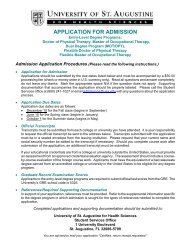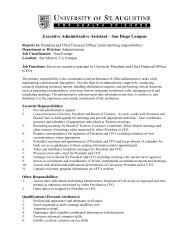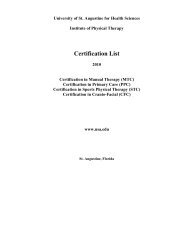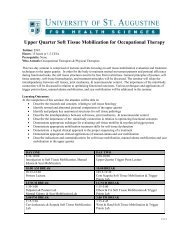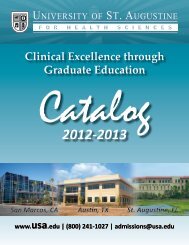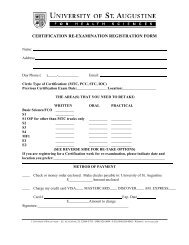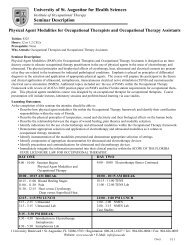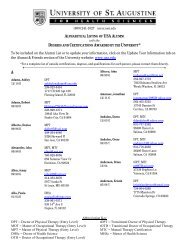CATALOG - University of St. Augustine for Health Sciences
CATALOG - University of St. Augustine for Health Sciences
CATALOG - University of St. Augustine for Health Sciences
Create successful ePaper yourself
Turn your PDF publications into a flip-book with our unique Google optimized e-Paper software.
BSC 6102E – Interventions <strong>for</strong> the Older Adult with aNeurological Impairment Hours: 3The student will discuss issues and interventions concerning the older adult client/patient with aneurologic impairment. Topics include the impact <strong>of</strong> aging on the nervous system, innovations inmedical management <strong>for</strong> neurologic conditions, OT/PT interventions <strong>for</strong> motor learning, balance, falls,assistive technology and client/patient centered education programs. Current literature will be used todevelop evidence-based treatment programs that impact function.BSC 6102 - Interventions <strong>for</strong> the Older Adult with a Hours: 3Neurological ImpairmentThe student will discuss issues and interventions concerning the older adult client/patient with aneurologic impairment. Topics include the impact <strong>of</strong> aging on the nervous system, innovations inmedical management <strong>for</strong> neurologic conditions, OT/PT interventions <strong>for</strong> motor learning, balance, falls,assistive technology and client/patient centered education programs. Current literature will be used todevelop evidence-based treatment programs that impact function.BSC 6103E – The Pediatric Client with a Neurological Impairment Hours: 3The goal <strong>of</strong> the seminar is to provide participants with advanced knowledge and application <strong>of</strong> skilledobservation and intervention <strong>for</strong> the special needs <strong>of</strong> the pediatric client with a neurological impairment.The lecture component will include updates on treatment approaches used in pediatric intervention(motor learning and control theory, neurodevelopmental principles (NDT), my<strong>of</strong>ascial release treatmentprinciples, oral motor treatment, positioning, strengthening, and other treatment techniques) with anemphasis on evidenced based practice. During the lab component, participants will apply NDT,my<strong>of</strong>ascial release, strengthening, and other techniques to facilitate functional skills in infants andchildren with congenital and acquired movement disorders.BSC 6103 -The Pediatric Client with a Neurological Impairment Hours: 3The goal <strong>of</strong> the seminar is to provide participants with advanced knowledge and application <strong>of</strong> skilledobservation and intervention <strong>for</strong> the special needs <strong>of</strong> the pediatric client with a neurological impairment.The lecture component will include updates on treatment approaches used in pediatric intervention(motor learning and control theory, neurodevelopmental principles (NDT), my<strong>of</strong>ascial release treatmentprinciples, oral motor treatment, positioning, strengthening, and other treatment techniques) with anemphasis on evidenced based practice. During the lab component, participants will apply NDT,my<strong>of</strong>ascial release, strengthening, and other techniques to facilitate functional skills in infants andchildren with congenital and acquired movement disorders.BSC 6200 – Evidence-Based Research <strong>for</strong> the <strong>Health</strong> Pr<strong>of</strong>essional Hours: 3The amount <strong>of</strong> research available to the physical and occupational therapist upon which to base clinicaldecision-making with regard to diagnosis, prognosis, and management has multiplied tremendously overthe last 20 years. Within the currently predominant paradigm <strong>of</strong> evidence-based practice, every therapistneeds to be able to critically evaluate the evidence available prior to application into clinical practice.The Evidence-Based Research course is an introduction to research methods, psychometric properties <strong>of</strong>tests and measures as used in the clinical situation <strong>for</strong> diagnosis, prognosis, and assessment <strong>of</strong> outcomeand risk <strong>of</strong> harm, clinical prediction rules and clinical practice guidelines, sampling, experimental design,statistics, literature review, evidence-based practice, research models, and conducting article critiques.The purpose <strong>of</strong> this course is to enhance inquiry skills from both multicultural and multi-pr<strong>of</strong>essionalviewpoints. The main emphasis <strong>of</strong> this course is to allow the students to become critical consumers <strong>of</strong> the87



